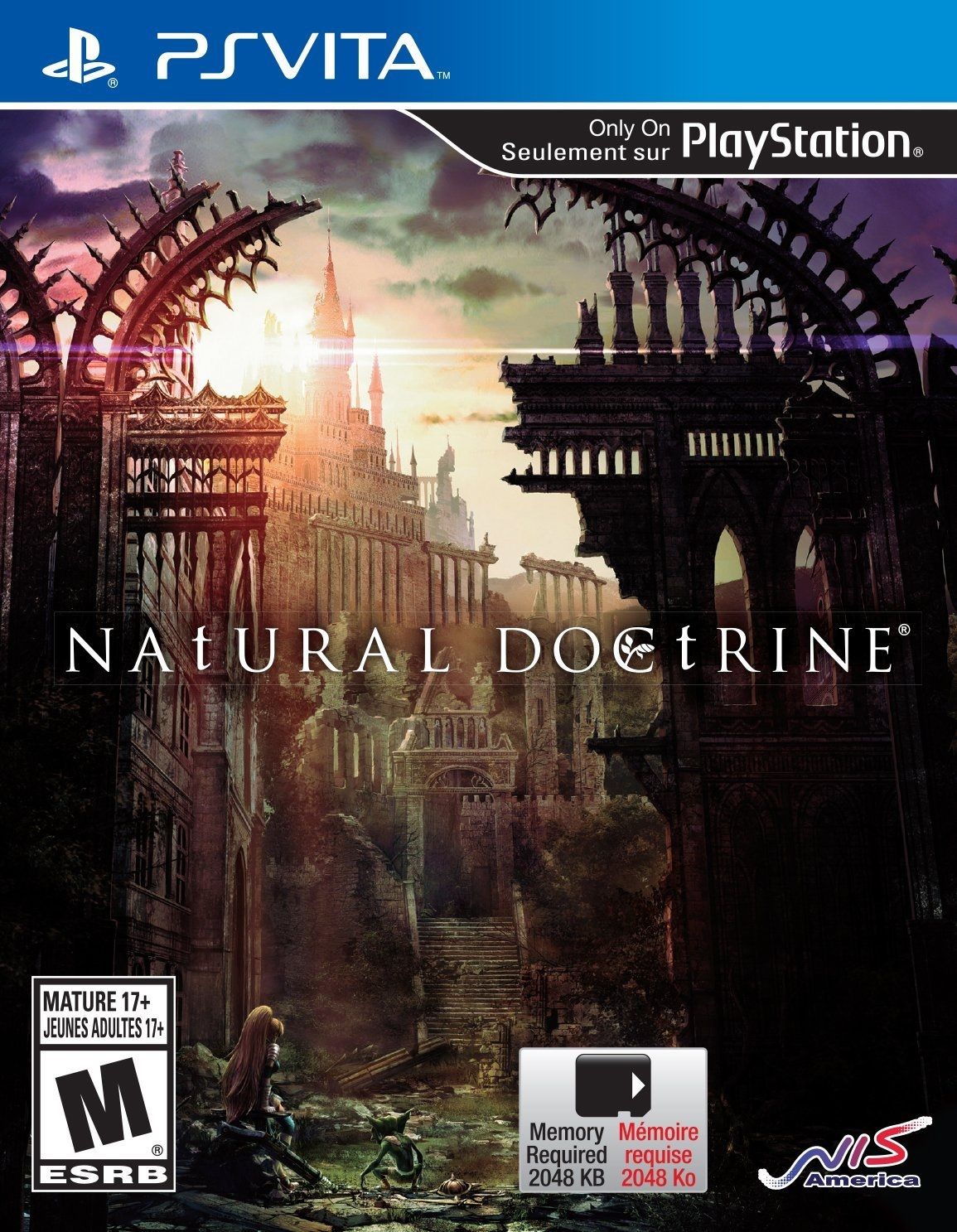First impressions are vital in any meeting -- whether it be between two people, a person and a location, a person and soon to be beloved pet, or even between a potential buyer and a videogame. They establish what your relation with this person, place or thing will be and far more often that not, they are absolutely on the mark.
By this logic, my first impression of Natural Doctrine though its many trailers before release was a rather grime tale of poorly-lit stages and line-filled, yawn-inducing combat. If my first meeting instead counted as the first time I booted up the game, the picture it painted was just as bleak. I was greeted with bare-bones visuals for a PS Vita title (I can't imagine what it was like for those playing on PS4) and voice-acting that gives Street Fighter the Movie a run for its money, then thrown into a confusing and at time overwhelming battle system.
All of this seems to set up for a game that disappoints from beginning to end, right?
Somehow, Natural Doctrine managed to subvert my expectations and shine as an excellent, albeit flawed, strategy JRPG.
The creator compared Natural Doctrine to the likes of Final Fantasy Tactics and similar titles (this game is actually the latest outing from Final Fantasy creator Hironobu Sakaguchi), which naturally set the bar to a standard that it would never reach in the eyes of gamers. However (and I say this as an avid fan of that title), in terms of gameplay Doctrine really does reflect the aforementioned titles' influence.
Characters move around according to designated sections on the map and each one must wait for their Next Initiative before moving. They choose from a variety of attacks, skills and (depending on class) can even switch weapons. Like Doctrine's inspirations, players must take into account general party proximity to enemy units, weapon and spell range, terrain, obstructions that would block gunshots, etc.
And then of course there's the little throwback mechanic called "learn the system or die" that's so popular with old school titles. The name of this game is the Link and Initiative system. The first is when two or more characters perform similar attacks aimed at the same enemy (melee attacks, gun attacks or spells), a visible line forms between them. This link strengthens attack power, boosts critical hit ratio and, depending on who you link with, can even net a special attack. Geoff, Vasily and Zeke with close range weapons for example will use Delta Attack to attack four times each, first on the same target then on any other targets remaining in that section.
Initiative ties into this mechanic as well. Initiative is essentially turn order and when you use a character that has fast Initiative (such as Geoff), you can Link attacks with other party members -- even those who normally wouldn't attack at that point. Learning how to accomplish this is vital for overwhelming foes, moving quickly through maps and quickly healing allies in trouble.
Naturally enemy units will exploit this system and, for the first part of the game, use it better than you. This leads into one of the most well-executed mechanics of Doctrine: the excellent enemy AI. Just as in the titles the creator took inspiration from, foes here are brutally intelligent. They know exactly how to use the Link and Initiative system, work together to execute ambushes, move quickly through a map to better position themselves, understand how to effectively use each of their skills and will even play the stalling game if they feel you're leading them into a trap.
It especially shines in the beginning when the enemy variety only consists of four types of green goblins; it's difficult to care when all of your concentration is focused on trying to out think and outmaneuver them, knowing that one critical mistake could spell out an early end (especially since your party is often outnumbered as well). More types of units added later on only serve to enhance combat and push your thinking to the limits.
Another element that adds to the strategy is learning how to ration your limited resource of Pluton. Pluton is the sole reason for clearing out Goblins in mines and other areas. Goblins stockpile the resource and humans must kill them to acquire it (the gruesome nature of this is brought up in the game). That amount is shown in a top bubble (pictured below weighed in grams) and is shared among the party. Spells use a certain amount of this material and since its very finite, you need to be smart about its use.
Terrain and the use of distance are two other features that are integral parts of this title. A good example is when your party encounters Orcs for the first time. Goblins can be safely attacked from melee range but, as you see from the unfortunate soldiers that fell to their monstrous strength, Orcs required long range attacks to effectively take out to avoid party member deaths. That mission also served to teach players another grime tactic: how to use humans as damage shields during battle.
The one after that taught players how to properly shield guest units while keeping your own unexposed. Each battle, whether through the surprisingly detailed and competent tutorials or through simple trial and error, teaches players a new lesson, a new facet in combat, that builds until you're left with a complex and interwoven system.
That's where Natural Doctrine shines: its well-developed and engrossing gameplay. One can easily tell that was where the brunt of the development cycle was focused, and that fact absolutely shines. If you're a fan of hardcore strategic mechanics in an RPG, this game is heaven on earth.
Of course, there are a few drawbacks present as well. While I did enjoy how terrain played a role in vantage point, as well as whether an attack will even hit, I felt this feature could have been fleshed out even further. In Final Fantasy Tactics, terrain had a huge effect on battle: how and where characters could move, skills that could and couldn't be used, how far a character could travel in certain environments, etc. Tactics pushed that even further with the addition of weather that potentially hampered movement even more. Doctrine doesn't have any of this, which is a bit disappointing.
Another drawback is the lack of freedom in devising strategies. In the aforementioned game, there was always a number of ways for a sortie to be played out; attack head-on, split your units into teams and flank the enemy, keep everyone together and overwhelm units one at a time, and more. In Natural Doctrine, however, you must always play by the system's specific rules without any room for deviation or else you get a lovely gameover screen. (And gameovers are no joke either -- if one character on your team dies, that's it. There are checkpoints at least.)
This issue is a bit conflicting, though. It certainly is a problem and can be suffocating at times when you want the freedom to be more creative. On the other hand, there's something challenging about working with such constraints and crafting from them a near perfect victory.
Additionally, the constant mining for Pluton becomes quite the chore, especially for later battles that require plenty of Pluton-based spells and skills. What makes the task especially tedious is that you get a very small amount per chest, and the majority of maps only contain a few chests at most.
As I mentioned before, the brunt of the game is focused on gameplay, so other aspects are a bit bare-bones. Graphics are the number one offender; if the budget wasn't there then the devs should have used a more stylized approached. Instead, other than the anime profiles, the overall realistic look only serves to enhance the blandness of each stage.
Plot was another factor that took a backseat to gameplay which, funny enough, was actually a good choice in this case. Unlike many other JRPGs that artificially lengthen the plot by dispersing key plot points in wide intervals while adding in too much foreshadowing and drama, Doctrine takes a different approach. Major plot points are dropped regularly, the overall story moves along briskly and there's no overwrought build-up that would normally kill any suspense. This is of course done to keep the focus purely on gameplay with the plot serving more as a vehicle, but the effect is oddly refreshing.
Natural Doctrine is not meant for the faint of heart. You must be prepared for unyielding and at times near hellish combat that only rewards careful planning and the use of intelligent strategy over brute strength. For those who enjoy these elements in their strategy RPG, however, this title will not disappoint.


